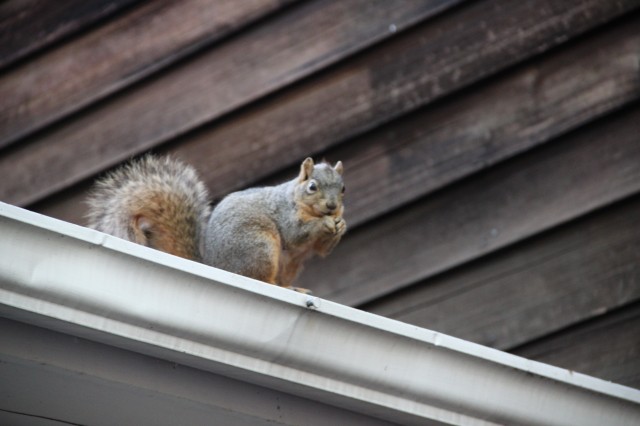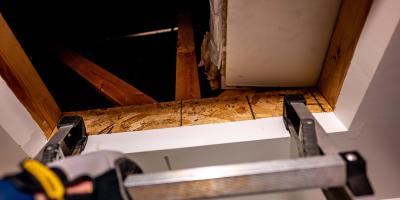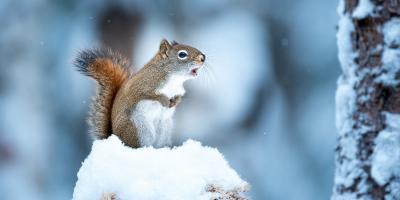5 Ways New Englanders Keep Squirrels Out Of Chimneys And Attics

Days are shorter, nights are longer, and temperatures are dropping - here in New England we’re full on into fall, and it’ll soon be time to light up the fireplace and dig into the attic for holiday decorations - which, if you’re not careful, could bring on an unwanted run-in with a stowed-away squirrel.
With squirrel populations on the rise throughout New England this year, homeowners in the northeast have learned a thing or two about recognizing squirrel infestations when they occur. That slight scratching noise you might hear coming from your attic or beyond the ceiling is a prime example, and could indicate you’ve got an unwanted invader taking refuge in your home’s least-trafficked areas.
Here’s a look at some simple ways homeowners throughout New England make sure squirrels stay away from chimneys and attics straight through fall.
1. Keep Your Chimney in Good Shape
Let’s be honest - most homeowners don’t give their chimney a whole lot of thought during the spring and summer. But those months of inattention can all come back to bite you come the cold season, when a chimney may just be the perfect place for a squirrel to take refuge.
That’s why it’s always a good idea to keep consistent tabs on your chimney’s condition, and to make sure it’s fully outfitted for year-round pest prevention
A chimney cap, for instance, is an easy and inexpensive way to keep your chimney in good shape year after year - but is not necessarily something every homeowner may have installed or kept in good shape. Made of wire mesh with a flat, often metal top, chimney caps can help keep everything from pests and water from running down your flue - and that could be all you need to prevent squirrels from coming in and starting a nest.
If you do notice squirrels in your chimney, do not light a fire to try and smoke them out. Not only is this inhumane, but it can also be dangerous, since a squirrel nest can block airflow and send smoke pouring back out through your fireplace. Additionally, young squirrel babies may not even be able to escape on their own, and should be dealt with by a pest removal professional only.
2. Prevent Food Temptations
One reason squirrels may even find their way onto your property (and into your home) in the first place is because something led them there - often, something edible.
Keeping food within easy reach of squirrels may not be your intention, but food sources like bird feeders, pet food storage areas, and even oak trees with lots of acorns left scattered around the base can be prime temptations for squirrels looking for a quick bite. Worse yet is that once they’ve identified a reliable food source, squirrels are more likely to seek out reliable shelter nearby - and your home may just be what they’re looking for.
While it may not be possible to keep every acorn off your lawn in fall, preventing the buildup of food items around your property can be achieved with some forethought. Bird feeders, for instance, should be thoroughly squirrel-proofed (the birds will thank you for it). Likewise, be sure to keep any pet food stored out of reach, and make sure to clean up after those autumn picnics or the last barbecue of the season before rodent invaders catch a whiff and come looking.
3. Seal Off Any Entrances Around Your Home
While an unprotected chimney may offer an easy entrance to a squirrel looking for a place to nest, it certainly is not the only entrance squirrels can use to make their way inside your home.
Broken windows and doors, gaps in your roof or along the roofline, cracks in your foundation, and other hard-to-spot openings can offer a potential opening for squirrels, and should be patched up or repaired before these rodents even get the chance to slip inside.
Some of these easy entrances may be easy to spot with just a cursory glance. Take a look around your foundation and roofline for any signs of damage, and inspect any exterior-facing doors or windows for signs that they may not be closing or sealing correctly. In addition, it may be a good idea to have a pest exclusion professional conduct a thorough inspection to catch those particularly difficult entrance points.
4. Make Your Home Harder To Reach
Like a moat around a castle making it harder for invaders to reach the gate, a “protective barrier” around your home can make it significantly more difficult for a squirrel and other pests to bridge the gap between outdoor life and a cozy spot in your home.
Trees, for example, can be an easy method for squirrels to use to gain access to your roofline - especially if those tree branches touch or hang over your roof itself. Likewise, wood piles kept too close to your home can offer an inviting hiding place for a squirrel looking to make the daring dash inside. By clearing out these travel pathways for squirrels to make their way inside unseen, you can make it much harder for a squirrel (and other pests) to even reach your home in the first place.
5. Start Your Exclusion Process Early
We’ve said it before and we’ll say it again: when it comes to pest control, an ounce of prevention is worth more than a pound of cure. That’s why we recommend taking steps to prevent squirrel invasions long before the cold starts to set in. By thinking proactively about pest prevention, you and your pest professional can identify and repair those gaps or easy entry points long before a squirrel finds its way inside.
Your experienced pest professional can conduct complete, seasonal inspections of your home to catch those weak points in your prevention strategy and take steps to close the gaps before the situation becomes and emergency. Not only will this represent savings in the long run for you, but it will keep your home much better protected than reactive responses when problems arise.
Looking for a simple way to keep your home or attic squirrel-free? Do what New Englanders have done for over nine decades - call JP Pest Services. Our wildlife removal experts offer experience and humane removal strategies to help keep your home free from fall invaders straight through until spring and beyond. Get in touch today and see what we can do to keep those squirrels under control.



